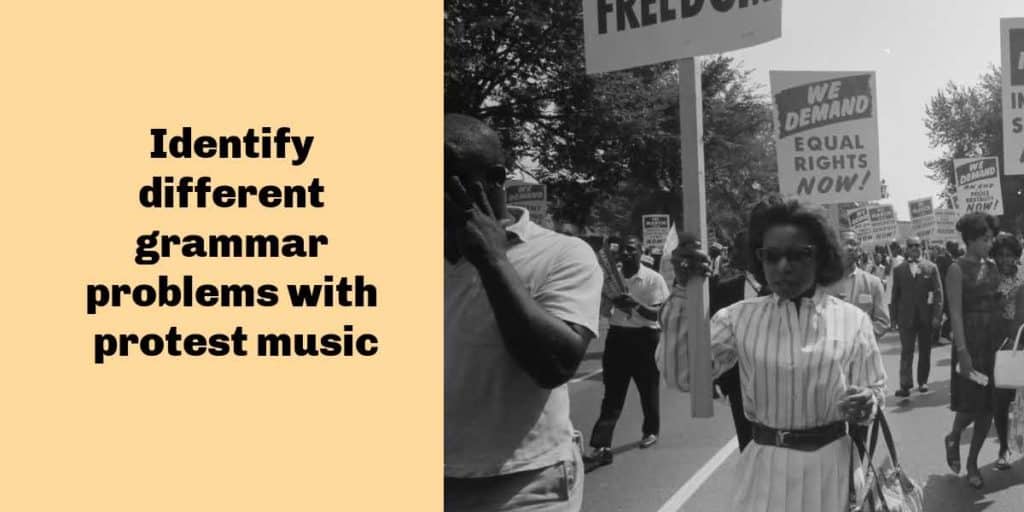Genre: Various; Level: Various
(You’ll find a short vocabulary list at the bottom of this article containing the underlined words. If there are any other words you don’t understand, don’t hesitate to ask).
Hi! Today I am going to write about how you can identify different grammar with protest music.
Protest music has been around ever since the first piece of music was written. Protest music is not unique to one genre of music. If we look back at history, it has been in many different forms for example blues, reggae, pop, folk, psychedelia. Here is what we are going to look in this blog post:
- What is protest music?
- What is the impact of music?
- Who wrote the first protest song?
- More examples of protest songs
- Identify different grammar
what is protest music?
Protest music aims to make social messages and make a change. The message can be anything: from the recent Black Lives Matter protests to as far back as the Vietnam War in the 1960s. Society influences protest music as much as the music influences society.
What is the impact of protest music?
According to Martin Luther King, protest music ‘serves to give unity to a movement’. Jimi Hendrix once said, ‘if there is something to be changed in this world, then it can only happen through music.’ We can see that these two famous people see protest music as very important to make people hear a message.
Who wrote the first protest song?
No one knows who wrote the first protest song. There is, however, evidence to show that the first protest song dates back to the American War of Independence. Joseph Warren wrote ‘Free America’ in 1774 proclaiming independence for America from the colonial forces of the Dutch, Spanish and English.
From this early example, we can already see a characteristic of later protest songs: a strong message and also a rhythm, which gets people moving.
Grammar
For those of you, who didn’t understand all the words, here are the lyrics.
As you can see, there is use of old-fashioned English in this song. Nevertheless, we can see use of everyday English in this song. Here are some examples:
- Past simple. The beginning of the 2nd and 3rd verses use this tense to talk about completed actions. The completed actions are the Americans led freedom and a paradise of pleasure was opened. The second example is past simple passive. This is because we don’t know who did the action
- Present perfect to describe an action that finished sometime in the past and has a relationship with the present. The singer says, “we’ve never fallen prey”. This is actually a life experience that the American soldiers were killed by British soldiers.
more examples of protest songs
With the emergence of popular music, there have been many hundreds, if not thousands of protest songs. Here are some of my favourites:
1. The Times They Are A-Changin’ (Bob Dylan); 1964; Level A2
This song may be over 55 years old, but it is still one of the best known protest songs. Dylan talks about many different topics, which are relevant for the time. He starts with the Civil Rights Movement and then moves onto the anger that young people had during the 1960’s.
Within this song, we can identify different grammar, but the most commonly used thing is the gerund (a verb made into a noun). Examples include ‘you better start swimmin” and ‘the battle outside ragin’‘. The gerund is an abstract noun – a noun that is not an object. In these cases swimmin’ and ragin’ are the gerunds.
If you would like to learn a little more about Bob Dylan and his music, read my previous post here.
2. Get Up Stand Up (Bob Marley); 1973; Level A2
Bob Marley wrote this song at a time when people in the Caribbean had just gained independence from the British. The simple message he gives is about fighting for your rights.
And the most commonly used grammar in this song is the imperative to command people ‘to stand up and fight’. Stand up in this case doesn’t mean physically stand up, but to let your voices be heard.
For more information about the imperative, read my previous post here.
3. American Idiot (Green Day); 2004; Level B2
Green Day wrote this song when there was a lot of tension in America. They protested against the ‘War on Terror’ and how it influenced American society.
We can identify different English grammar and vocabulary (some of which is improper use of English). The main aspect we can see is irregular and improper use of English. Irregular use of English is common in popular music, because it makes things easier to sing. The improper use of English in this song is to reflect anger towards the American government at the time.
4. Say It Loud (James Brown); 1968; Level B1
One of the best songs from the Godfather of Soul, this song is about the fight against racism in America in the 1960s. Something of an irony, Brown used white and Asian kids to help him sing this song.
Numerous different grammar forms can be seen here including the present perfect, the imperative. We also see rhyming words in the chorus: loud and proud.
Identify different grammar
As you can see, you can identify different grammar from these protest songs. Protest songs, like many popular songs in general, have many different grammatical and vocabulary aspects. It is important to remember that you should choose a song you like. This way it makes it easier to improve your English skills.
Read this previous blog post, to find out how to improve your English skills in six simple steps.



Pingback: Sound like a native with rap music - Learn English with Tommy